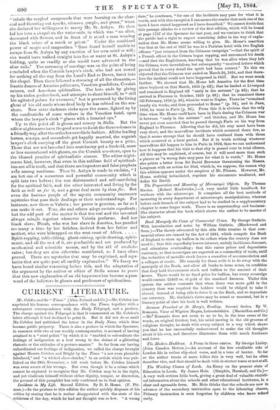Incidents ire My Life. Second Edition. By D. D. Home.
(F. Pit- man.)—In the preface to this edition the author quickly disposes of his critics by stating that he is rather disappointed with the state of the criticism of the day, which he had not thought was so low. "A wrong date," he continues, "for one of the incidents may pass for what it is worth, and with this exception I can assure the reader that each one of the facts I have stated happened as I have described." We cannot doubt that this passage alludes to a review of the first edition, which will be found at page 1757 of the Spectator for last year, and we venture to think that the public had a right to expect something fuller in the way of expla- nation than Mr. Home seems willing to give. Mr. Home's assertion was that at the end of 1857 he was in a Parisian hotel with two English officers "just returned from the Crimean campaign "—that the spirit of a French officer in the Crimea began rapping, and announced his death —and that the Englishmen, knowing that he was alive when they left the Crimea, were incredulous, but subsequently "received letters which proved that in every detail the spirit had been correct." To this we objected that the Crimean war ended on Mar& 30, 1856, and that there- fore the incident could not have happened in 1857. But we went much further. We showed that Mr. Home left America for the first time since boyhood on 31st March, 1856 (p. 62); that he landed at Liverpool and remained in England till "early in the autumn" (p. 86); that he arrived in Florence in October, 1855 (p. 88); that he remained there till February, 1856 (p. 86), when he went to Naples. There he "remained nearly six weeks, and then proceeded to Rome" (p. 94), and in June, 1856, he went to Paris (p. 95). From this it ia obvious that the only time when Mr. Home could have been in Paris during the Crimean war is between "early in the autumn" and October, and Mr. Home has never yet even asserted that he passed through Paris on his way from England to Florence. Allowing that he did, his stay must have been very short, and the marvellous incidents which occurred there few, so that it seems strange that he should have confused them with those which occurred at a later period. But if in truth nothing whatever marvellous did happen to him in Paris in 1856, then we can understand how it happens that his visit to that city is passed over in total silence. All this may be explained, of course, but it will need more than such a phrase as "a wrong date may pass for what it is worth." Mr. Home also prints a letter from Sir David Brewster threatening the Messrs. Longman with an action for libel, which is, we suppose, the reason why this edition appears under the auspices of Mr. Pitman. However, Mr. Home, nothing intimidated, reprints his statements unaltered, and defies Sir David.






























 Previous page
Previous page